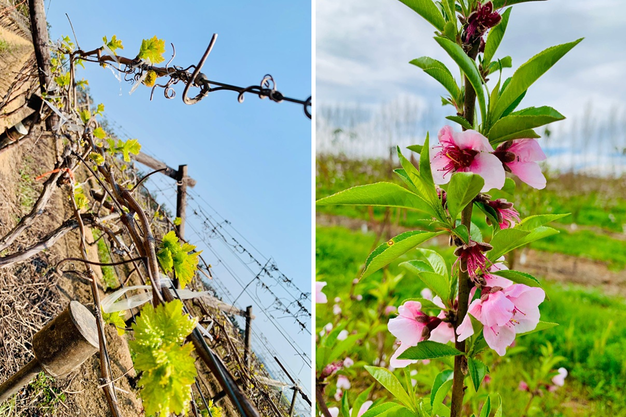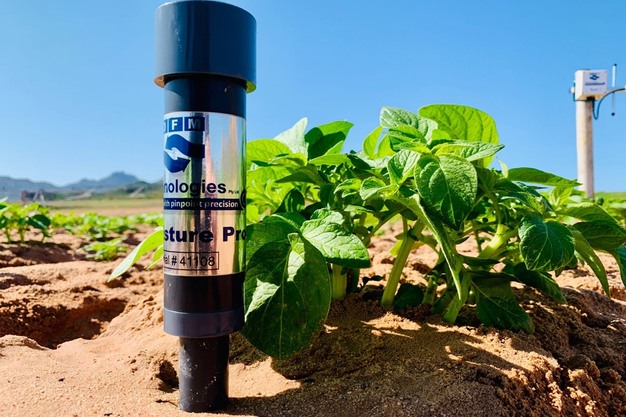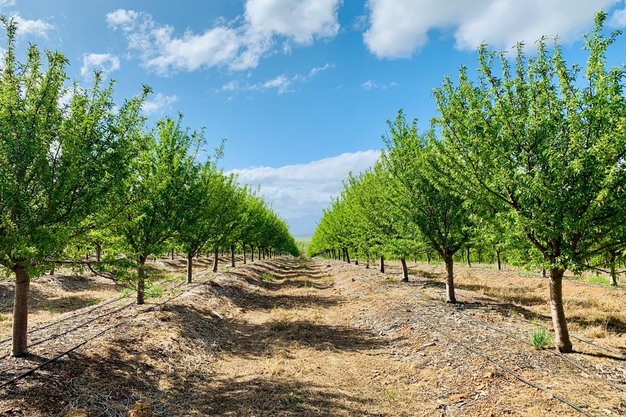After a drier-than-normal winter, vineyards and orchards in the Western Cape are surging ahead to an early spring. Grapevines are budding, citrus orchards are flowering, and blueberry pollination is largely complete. Since July, Duwan Jackson and his colleagues at DFM Technologies, a leading South African manufacturer and distributor of soil moisture and temperature sensors, have been working closely with their fruit and wine industry clients to prepare early for the critical growing season.
 © DFM Technologies
© DFM Technologies
Jackson took these photos a month ago on Western Cape farms, when it was officially still winter
First hundred days after flowering a critical period
The DFM Soil Moisture Sensor has become a household name in the agriculture industry as a trusted and accurate sensor, Jackson says, and has expanded its footprint globally to over thirty countries. He notes that Dirk Mercker, who developed the sensors over 25 years ago, is still actively involved in the company.
"The first hundred days after flowering are vital in most crops," Jackson explains. "That's when critical growth stages take place up until fruit development. This lays the foundation of a good harvest."
This season, Cape fruit growers face both a rainfall deficit and the likelihood of a hotter summer and limited water supply. As a result, Jackson observes that irrigation decisions are under sharper focus than ever before. But, he stresses, more water doesn't always mean better results. In his experience, many farmers achieve similar or stronger yields and quality improvements after finetuning their irrigation to apply less, but to apply at the right time when the crop requires it.
"Soil moisture sensors are central to modern water management," he maintains. "By linking soil data with evapotranspiration models and other technologies like satellite and drone data, you can understand exactly how much water the crop is using and needs, and schedule irrigation accordingly. But there's another aspect: over-irrigation affects soil temperature. When soils are cooler than optimal, metabolic activity slows down, reducing nutrient absorption, resulting in poor fertilizer uptake. That has a direct impact on growth and yield."
 © DFM Technologies
© DFM Technologies
He continues: "Furthermore, if soil temperatures increase with not much cover, you could see roots become stressed, poor microbial activity, and N and K uptake can decline, for example." By measuring soil moisture and temperature at different depths with the DFM Soil Moisture Sensor, growers gain valuable real-time insight into what is happening below the soil surface and can irrigate when the plants actually need it, he says, rather than following a rigid schedule.
During more than sixteen years within the industry, Jackson has built relationships with thousands of growers, witnessing the resilience and innovation that drive the sector forward. "This continues to drive me daily to play a meaningful part in the industry and encourage others to do the same.
He remarks that despite the worrying start to the season and the continued uncertainty about tariffs, the mood in the industry remains very positive. "Last year's harvest was a strong recovery in most fruit categories, and many farms are investing capital in new packhouse expansions, infrastructure, new orchards, and technology." This aligns with the focus on smart technology for efficient resource management which he saw at the recent Nampo agricultural show in Bredasdorp, Western Cape.
"I'm passionate about helping ensure that the next generation of farmers benefits from the good decisions being made today, so that they can continue farming into the future."
 © DFM Technologies
© DFM Technologies
Almond orchard in the Boland
For more information:![]() Duwan Jackson
Duwan Jackson
Consultant/Sales
DFM Technologies
Tel: +27 82 554 2244
Email: [email protected]
www.dfmtechnologies.co.za
